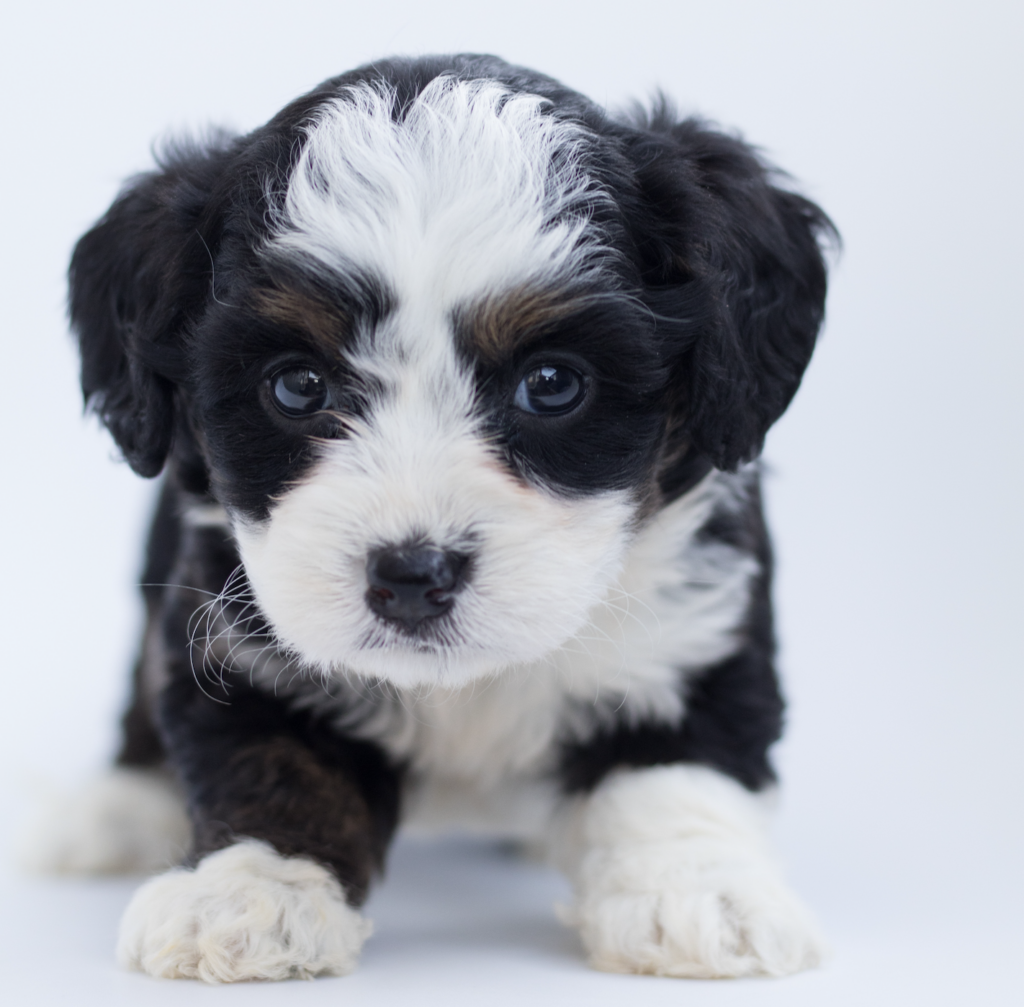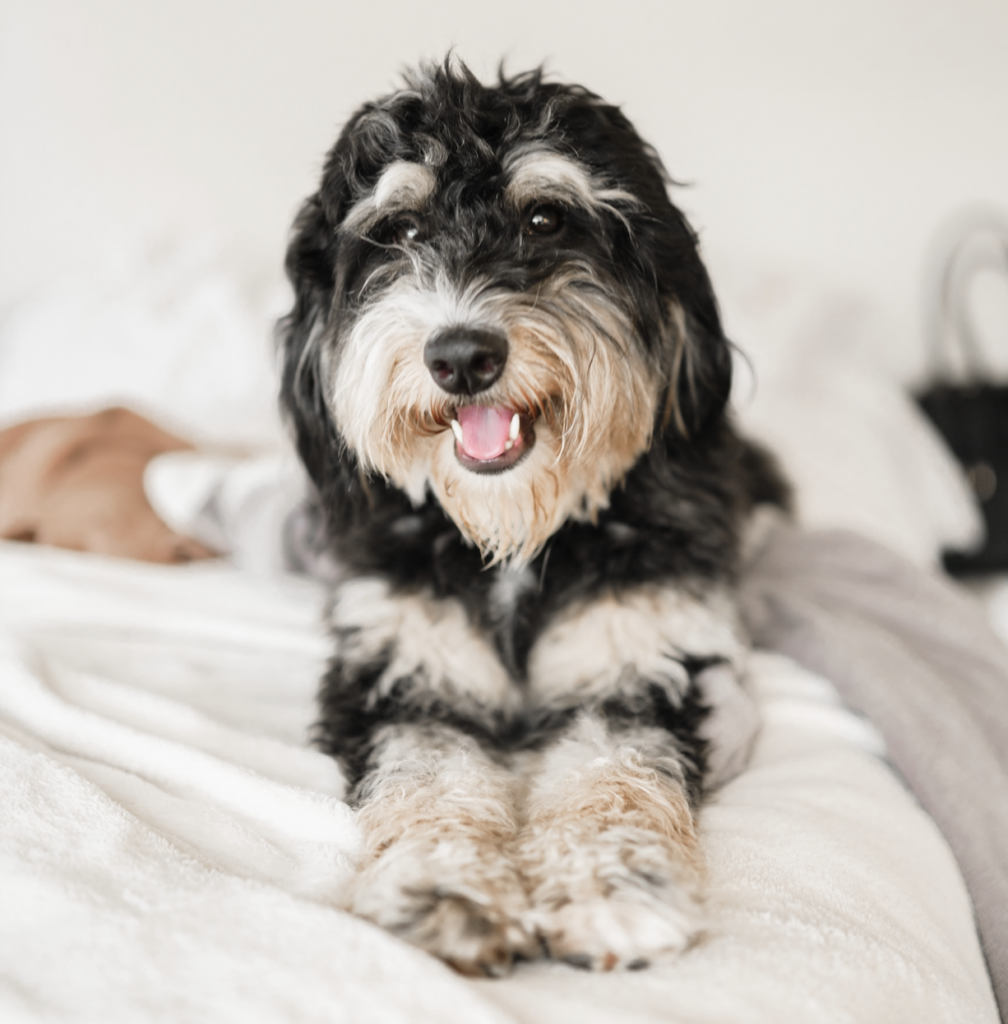
So you want to own a brand new Bernedoodle puppy! You’ve made a great choice. Bernedoodles are an extremely popular mix of the poodle and Bernese mountain dog.
Your first task is to find a reputable Bernedoodle breeder. But there are a wide range of dog breeders who are happy to take your money. How do you know which one provides the best value?
In this article, we’ll help you ask the right questions to ensure that your chosen breeder will provide you with a happy, healthy Bernedoodle puppy.
The 15 Best Questions to Ask Bernedoodle Breeders
1. What Bernedoodle generations do you offer?
Many people assume that all Bernedoodles are 50% poodle and 50% Bernese Mountain Dog. This mix is known as an F1 Bernedoodle.
But there are many more varieties to consider. If you are concerned about shedding and allergies, you may consider an F1B generation, which is the result of breeding an F1 Bernedoodle with a purebred Bernese Mountain Dog or poodle. An F1B puppy is usually 75% poodle. This makes it less prone to shedding than an F1.
An experienced breeder should be able to provide precise information about the Bernedoodle generations that they offer, so don’t be afraid to ask!
2. Can you provide references?
Before you make the significant long-term commitment of purchasing a puppy, it can be useful to hear the opinions of other people who have dealt with the breeder you are considering.
These customers can often answer many questions. Is the breeder ethical? Was the price fair? Has your Bernedoodle shown any long-term behavioral or health issues?
Reputable breeders will often display testimonials on their website. If they have permission, they may even provide you with the customer’s contact information so that you can ask questions directly. And if the breeder is listed on websites such as Yelp, you may find helpful reviews there.
3. How can you assure me that my dog is healthy?
As the proud owner of a new Bernedoodle puppy, you will want every assurance that you are purchasing a healthy pup. A good breeder will genetically test the parents for any hereditary health risks such as hip dysplasia.
Most breeders routinely deliver the puppy’s first vaccinations and deworming. Ask the breeder for a written health certificate, which is sometimes required for travel.
After the dog goes home with you, it will be your responsibility to arrange any vaccination boosters with a veterinarian. The vet should also check for parasites in case they were missed during the deworming.
4. How do you socialize your puppies?
Puppies need plenty of socialization with their mother and littermates. Ensure that the breeder allows puppies to socialize naturally in a clean, safe environment.
A Bernedoodle puppy will start to develop his own unique personality when he is four to five weeks old. Ask the breeder if they will document your puppy’s behavior and temperament. They should be flexible enough to provide you with the puppy whose personality suits you best. For example, an energetic, playful dog may be perfect for an active family with young children.
5. Will you remove my puppy’s dewclaws?
Dewclaw removal may sometimes be medically necessary, but doing so for cosmetic purposes is a controversial practice. Many veterinarians advise against this procedure unless disease or injury requires it.
Removing the front dewclaws can be especially harmful. It may lead to torn carpal ligaments, particularly as your dog ages. Be sure to consult with your veterinarian and confirm your expectations with the breeder.
6. What happens if I change my mind about owning a puppy?
At this moment, you are probably very excited by the idea of adopting a furry little Bernedoodle puppy. However, sometimes circumstances change, so you should ask a prospective breeder for their return policy.
Many good breeders would prefer for you to return the dog instead of taking it to a shelter. But they may only offer a partial refund, or no refund at all. And even if you change your mind before you take the puppy home, you may have to forfeit your deposit.
7. Will you provide a contract of sale?
It is customary for breeders to provide a written contract of sale when you purchase a puppy. This helps to protect both parties in case of any dispute.
The contract should specify information such as the amount and date of the transaction, as well as any relevant information such as color, breed, and vaccinations. It should be signed by both the seller and buyer.
8. How many dogs are currently in your care?
While researching Bernedoodle breeders, you may have come across the term “puppy mill”. This typically refers to an individual or organization that breeds and sells a large number of puppies without adequate resources to care for them. The result is a large number of dogs living in cruel, unsanitary conditions.
Ask any prospective breeder for the average number of dogs that they care for at a time. They should also give an estimate of the number of trained professionals on their staff. Do they have an in-house licensed veterinarian? If not, who provides medical care and what are their credentials?
9. Do you offer any guarantees?
An experienced breeder will do everything in their power to ensure that your puppy is healthy and happy before you take it home. But what happens if the dog gets sick?
Many breeders offer a limited health guarantee. For example, if the dog contracts rabies because they were not given a scheduled booster shot, that is typically seen as the responsibility of the owner. But if your pup develops a hereditary disease such as hip dysplasia within its first few years, the breeder may offer a replacement or contribute some amount toward medical expenses.
Non-medical guarantees are uncommon. If you find that your chosen Bernedoodle does not suit your personality, the breeder will probably not assume responsibility.
10. What do you feed your puppies?
As with any other dog breed, it’s important that your breeder is providing the best food for Bernedoodle puppies. They will need plenty of protein for lean muscle development, as well as all essential vitamins and minerals.
Ask the breeder for any specific food recommendations and when to switch from puppy formula to adult dog food. They are the Bernedoodle experts, so they should have plenty of experience with the nutrition that this crossbreed requires.
11. Would you like to ask me any questions?
This is one question you shouldn’t have to ask. Any great breeder will care deeply about the welfare of its puppies. They should be very interested in any information you wish to provide about your home and family. They will love to hear about your plan for caring for the dog.
In some ways, purchasing a dog is a simple financial transaction. But breeders also want their dogs to be healthy and happy, even after the sale is finalized. They also care about their own reputations.
The breeder may even ask you to provide a testimonial or reference. However, they should also respect your privacy. You should never feel obligated or pressured to do so.
12. Do you offer hypoallergenic Bernedoodles?
This one is related to the earlier question about the puppy’s parents. If anyone in your home suffers from allergies, you should ask the breeder if offer Bernedoodle puppies that are bred to be hypoallergenic. You will probably want a mix that genetically closer to a poodle.
A breeder can maximize the Bernedoodle’s hypoallergenic properties by breeding an F1 (50% poodle, 50% Bernese Mountain Dog) with a purebred poodle. The puppy will probably have curlier hair than an F1 Bernedoodle, and will likely shed less of its coat.
Keep in mind, however, that no dog can be considered fully hypoallergenic. If you are allergic to dog saliva, the breeding techniques and curly coat will not help much. In this case, you could also consider a smaller breed that produces less saliva.
13. How much will my dog cost?
Owning a dog can require many unexpected expenses, so be sure you understand the full cost of the Bernedoodle you are purchasing. The price of your puppy may depend on many factors such as color, size, generation, and market value.
If your chosen breeder has a lot of experience and a great reputation, they will probably charge more for the value they are providing. They may also require a deposit in advance.
14. Can I choose my puppy when the litter is born?
Some breeders allow clients to meet the litter and choose the dog they want. In these cases, the customer with the earliest deposit date often gets to choose first. This selection process is enjoyable for many Bernedoodle owners.
However, other breeders insist on choosing the dog for the owner themselves. They find that buyers are susceptible to emotion when the first puppy eagerly runs up to them. This may feel like a special moment, but it does not mean that this dog’s personality and temperament are best suited for the owner. These breeders prefer to identify the owner’s expectations and living arrangements in advance so that a compatible Bernedoodle puppy can be chosen for them.
15. At what age can my dog come home with me?
Adopting a dog can sometimes feel like a long process. But for many breeders, the wait is necessary. Once you have paid your deposit, you must wait for the litter to be born. Then the puppies must be allows to bond with their mother and littermates. Finally, many great breeders will ensure that the puppy is de-wormed and given all required vaccines.
In many cases, you can take your Bernedoodle home when they are about eight weeks old. Ask the breeder to provide a detailed timeline so you know what to expect throughout the adoption process.

Conclusion
Finding a good dog breeder is no easy task. This is especially true for Bernedoodles, who are offered in many varieties and can be prone to certain hereditary health conditions. We hope this article has helped you establish your expectations for Bernedoodle breeders, and we wish you luck as you continue in the adoption process.